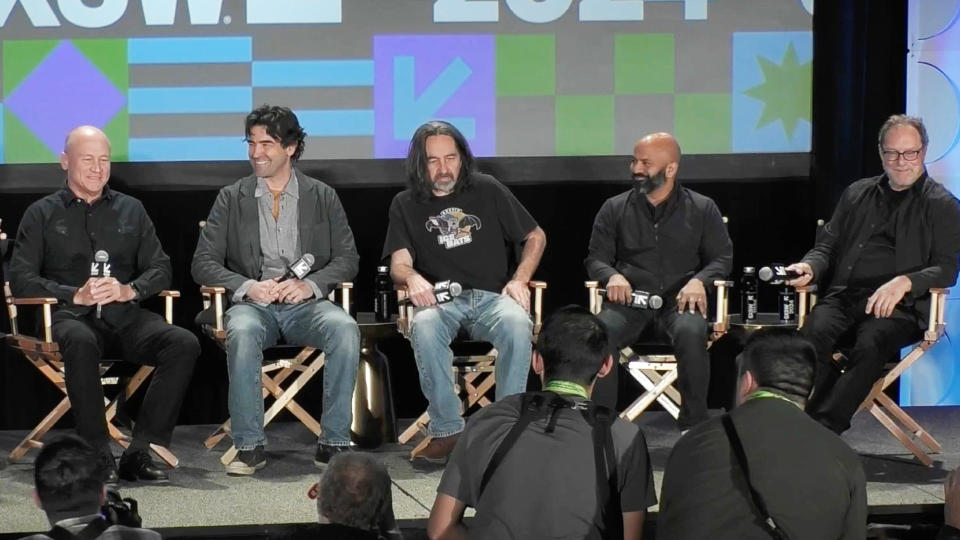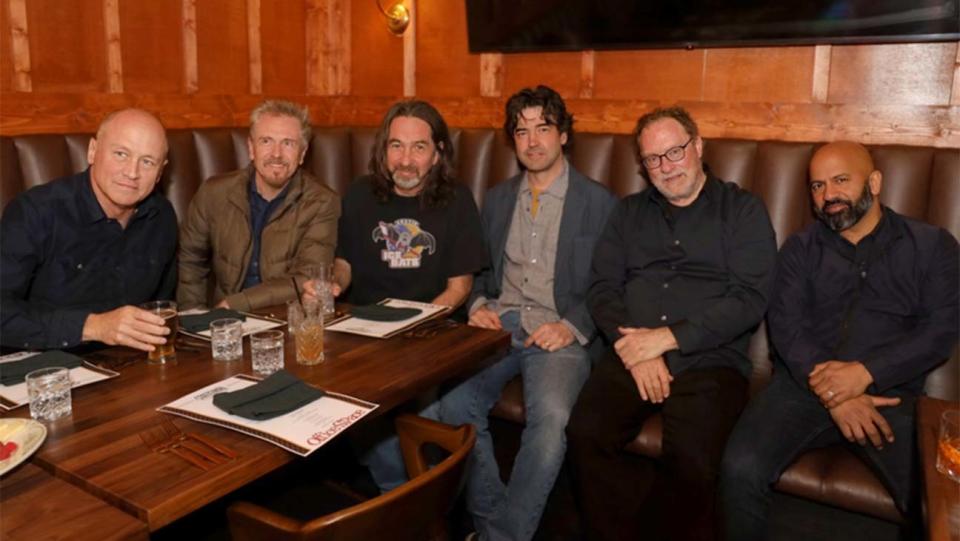‘Office Space’ Reunion: 10 Things You Didn’t Know About Mike Judge’s Classic

Mike Judge and his Office Space cast reunited at South by Southwest Film & TV Festival for a panel discussion March 9 sponsored by The Hollywood Reporter about the beloved and influential film — a title that arguably reinvented the workplace comedy for the modern age and popularized the concept of quiet quitting. While the panel discussion tackled several intriguing aspects about the film’s creation and reception (some highlights below), Judge revealed a few extra tidbits at the post-panel reception at Austin’s The Statesman restaurant.
Asked if there was anything he would change about the film (which was famously difficult to get made, with the writer-director fending off a blizzard of studio executive TPS reports, er, notes), Judge offhandedly noted he hasn’t seen his film since before it was released in 1999. Everybody in earshot of this (including star Ron Livingston) looked surprised, given the film initially flopped at the box office but then surged on cable and home video specifically due to fans watching it over and over again. Office Space is, if nothing else, ever rewatchable (as one passerby who snapped a photo with Livingston said, “I love this movie so much, I’ve seen it at least 40 times”).
More from The Hollywood Reporter
SXSW: Dev Patel Gets Standing Ovation for Directorial Debut 'Monkey Man'
'Dickweed' Review: A Severed Penis and a Prison Escape Somehow Make for a Bland Documentary
“Not sure why exactly, but every time I’ve started watching it, I just kind of think, ‘Nah I’m gonna go do something else,'” Judge explained later, noting he has watched the first 15 minutes of the film but then stopped. “It brings back stressful memories, I suppose. There are scenes I like watching, though — like the printer smashing, or all the scenes with Gary Cole. I just feel like I’ve seen it enough.” Judge added that he felt like he watched the movie “1,000 times” during the postproduction process.
As for something he’d change about the film, as it so happens, there is something.

“There’s a shot near the end of Ron when the building’s burning down and there were like three takes,” said Judge, who also lives in Austin, where the movie was filmed. “There was one that’s a little subtle, and then there’s one where he breaks into a big smile. The studio wanted the other take. I thought, you know, [let the studio win that fight]. I actually looked up on YouTube thinking about that scene and I shouldn’t have [given in].”
Asked if he thinks he could sell Office Space as a movie today, Judge looked doubtful. “Probably not,” he said. “It seems really hard to sell movies in general today. It was hard to sell it then, too.”
During the panel, Judge also confirmed he turned down making NBC’s The Office — which was the U.S. version of Ricky Gervais’ U.K. hit — and at the reception afterward he explained why.
“So they sent me a package with DVDs of Ricky’s British Office and some [press clippings],” he said. “And the first review I read said, ‘The Office succeeds where movies like Office Space failed,’ and I just [pretends to throw down the imaginary review]. Later I was told, ‘You have to see this British show’ and I was like, ‘Eh, all right,’ and then I just loved it.”
Asked if he regrets turning it down, Judge said, “I just didn’t want to go back [to that genre]. I had a pretty rough experience on Office Space, and I didn’t want to go through all that again. Then it went to [Judge’s King of the Hill co-creator Greg Daniels] and I loved what he did with it, it’s an awesome show. So I don’t regret it.”
Reflecting on his character, Livingston thinks Peter Gibbons is ever-relatable as the film isn’t about career ambitions like the title might suggest, but rather, “It’s a story about a guy trying to climb out of depression.” Livingston also confirmed one of the film’s most famous lines was something he improvised, when one of the “Bobs” notes he’s been missing a lot of work and Gibbons drolly replies, “I wouldn’t say I’ve been missing it, Bob.”
At the reception, the Office Space crew dined on cheeseburgers, salmon, collard greens and mac-and-cheese, and enjoyed a special themed dessert: A “Happy Birthday Bill” cake — like the one featured in the film celebrating despised Initech boss Lumbergh (Cole, who wasn’t able to attend SXSW). The actors gave out pieces of the cake to the restaurant’s star-struck patrons.
Here are some of the revealing highlights from the panel, moderated by Stacey Wilson Hunt, which 600 people attended at a sold-out convention center venue.

The studio, 20th Century Fox, wanted Livingston to lose weight for the lead. “My reps called me on Tuesday and said, ‘They want to know if you’ll fast until the screen test on Friday.’ And I laughed. And nobody else was laughing. They’re like, ‘It’s a real question.'” Livingston told them he’d try and went and jumped rope for 15 minutes and then gave up trying to fast the next day (which seems precisely like what Peter Gibbons would do).
Stephen Root was effectively blind while shooting because Milton’s glasses were so insanely thick. “I know that wasn’t too fun for you,” Judge said. “I just kept [telling the prop department], ‘Thicker, thicker.’ Root said: “I had no depth perception and every time I had to reach for something I had to practice it because I had no clue.”
Judge auditioned to play the role of Stan, the manager of the Chotchkie’s restaurant, and showed the tape to the studio. “I had specific image of a very passive-aggressive [demeanor], and I couldn’t get anyone to do it. So I put myself on tape, I legitimately auditioned for myself.” One of the actors who auditioned later told Judge, “Why did I waste my time when you put yourself in?”
Judge broke down the focus group where he famously won his battle with the studio to use rap music in the film: “I should have just said ‘no’ and threatened to take my name off it. But I did something I probably should not have done. I said [to the studio], ‘OK, if the next test screening for the focus groups don’t like it, I’ll take it out.’ The [studio’s] focus group moderator was trying so hard. It gets to the question, ‘So what do you think about the music?’ [The focus group replies] ‘Oh, it’s great.’ ‘What about some of the rap songs?’ ‘Oh, it’s great.’ ‘But maybe there were too many?’ — trying to get somebody to nod along with her. They would not give her anything. Then this one guy explains to her everything I’d been saying: ‘That’s what’s cool about it: You got these nerdy white boys and this music is angry.'”
Judge also discussed the very long roller-coaster journey of the film going from failure to success: “I fought so hard for the choices I made that I felt like I let everybody down and it affects other people’s careers. The first thing that happened is I got an amazing message from Chris Rock saying how much he loved it. I saved it for years. He said, ‘You got to make another movie because everyone’s gonna steal your ideas.’ Then Jim Carrey said he was a huge fan — I had never met him. And then just other people — David Zucker and Amy Heckerling. Then Madonna loved the movie and wanted to meet. She goes, ‘You know who my favorite character was? That Michael Bolton guy. There’s something sexy about how angry he gets.'” (Judge noted that Herman’s co-star, Jennifer Aniston, likewise confessed to having a crush on him.) Over the years, of course, the movie became regarded as a comedy classic. “This delayed reaction was really probably sweetest victory because it comes out and everyone’s like, ‘I told you so, you shouldn’t have cast those people, maybe next time you’ll listen to us,'” Judge said. “And gradually it’s like, ‘Oh, wait a second.’ So I always love hearing people say they liked it because we worked hard and failed at first, which makes it all even better.”
And here’s where the cast thinks their characters would be today. Livingston: “Peter is probably living in an ashram somewhere, on some spiritual journey, still trying to figure it out.” Ajay Naidu on Samir Nagheenanajar: “I always think of him as very wholesome. He probably did well and had a nice life. Very uneventful. He got that [job security he wanted].” Root on Milton: “He’s wedged between a bathroom door and a toilet, rotting away.” Judge on Lumbergh: “He’s continued to fail-succeed. Rise to the level of his incompetence. Middle management always does fine.”

Stacey Wilson Hunt contributed to this report.
Best of The Hollywood Reporter
